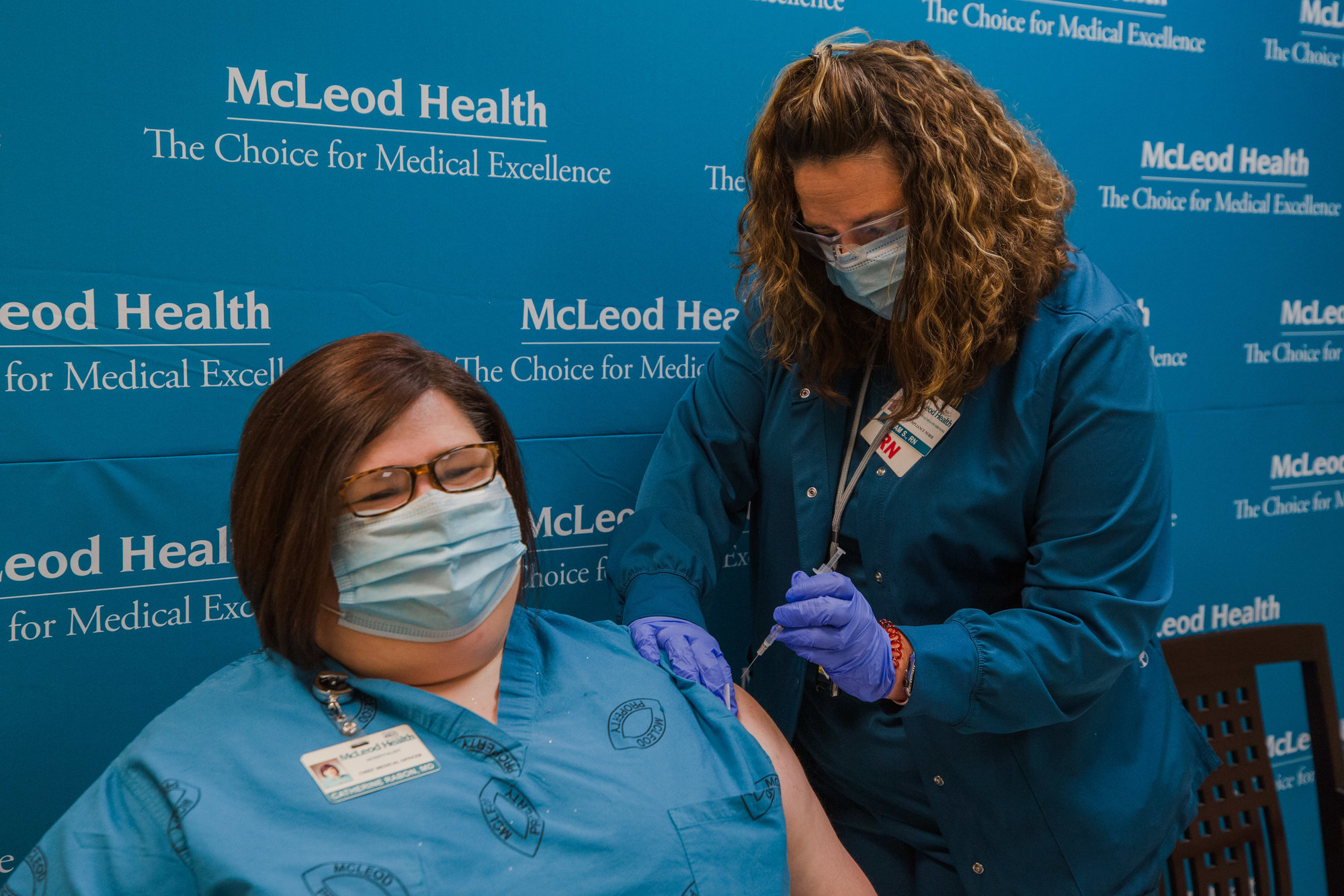COVID-19 vaccine arrives in Clarendon County
McLeod Health Clarendon employees among 1st in tri-county to get Pfizer vaccine
kareem@theitem.com
As the syringe was injected into her left arm, Dr. Catherine Rabon didn’t even flinch when the needle pierced her skin. Rabon, dressed in teal scrubs, prepared herself as she received the Pfizer vaccine shot Thursday morning.
“I think this is less painful than the flu shot. I didn’t even feel it,” said Rabon, the chief medical officer at McLeod Health Clarendon.
Rabon, along with 43 employees donning face masks, was among the first health care workers – and among the first in Sumter, Clarendon or Lee counties – to receive the Pfizer-BioNTech vaccine in Clarendon County as the first COVID-19 vaccines rolled out this week to frontline care workers in South Carolina.
Vaccinations, which are being given on a voluntary basis to McLeod Health Clarendon employees, began at 7 a.m. Thursday. A teal McLeod Health Clarendon curtain hung in the background as staff received the vaccine in the hospital.
Although hospital officials couldn’t give specific dosage numbers, they did detail the process of employees getting vaccinations in the hospital.
COVID-19 vaccines will be distributed to McLeod Health teams in three phases. Phase one will include employees in direct care of coronavirus patients and all McLeod Health active and affiliate medical staff physicians. Phase two includes employees in inpatient and outpatient departments with direct patient care responsibilities. In the last phase, the vaccine will be distributed to employees who serve in non-direct patient care departments.
McLeod Health Clarendon is one of 56 sites that received the initial limited supply of the Pfizer vaccine this week. McLeod Regional Medical Center in Florence started vaccinating its staff on Tuesday, followed by McLeod Health Cheraw on Wednesday and Seacoast also on Thursday.
DHEC has said the state is expected to receive between 200,000 and 300,000 doses by the end of the year.
The Pfizer vaccine requires two shots spaced 21 days apart.
Clarendon’s rural hospital has been overwhelmed with coronavirus patients at times since the beginning of the pandemic. The county has consistently had one of the highest hospitalization rates in the state and was at nearly 67% full on Thursday, according to state Department of Health and Environmental Control data. Hospital occupancy percentages do fluctuate frequently with McLeod Health Clarendon’s ability to transfer patients to McLeod Health’s hospital in Florence and others in the system.
Rabon said while the vaccine is starting to be distributed, now is not the time to let our guard down and that wearing masks is still important.
“I know everybody wants a sense of normalcy, but it’s too soon,” Rabon said.
Clarendon County has recorded 1,477 confirmed cases of the coronavirus and 71 deaths, according to DHEC data. Those numbers included the death of a middle-aged person from Clarendon reported Thursday.
Though the vaccine has arrived in hospital systems, there are some who feel uncertain about getting it.
“Everybody’s concerned. I’m concerned. It’s natural,” said John Rozich, a hospitalist at McLeod Health Clarendon.
Dr. Linda Bell, the state’s lead epidemiologist, said earlier this week she recognizes that some people are skeptical of the vaccine.
“We absolutely understand why some people are hesitant. This skepticism especially resonates among African-Americans and other people of color, whose history of how we were once treated horribly in previous experimental research is forever entrenched in our memories,” she wrote in a media update on Wednesday. “I understand the distrust. But I also know the result of that history. All studies involving humans now require initial and ongoing review to make sure appropriate steps are in place to protect the rights and welfare of humans participating as subjects in research.”
She said those processes were in place in the development of COVID-19 vaccines, and the review showed they are safe and effective.
“Unfortunately, groups that have the most skepticism are the same groups that have the highest rates of hospitalizations and deaths. We now have the ability to do our part to protect ourselves and others to end this pandemic by getting vaccinated. When it’s my turn, I’ll be among the first waiting in line to roll up my sleeve and get vaccinated.”
After getting her shot Thursday, Rabon mentioned some common side effects of receiving the vaccine can be redness, swelling and tenderness of the injection site, which can happen any time a shot is given.
“It was not painful. … I’d do it again,” said Steve Nathanson, the emergency department medical director at the hospital.
Health care professionals have tried to spread as much information as they can to the public about the vaccine through social media and communication tools such as local news and hope that by doing so they will help ease some of the community’s fears about the vaccine.
Rabon was one of many who were initially uncertain about the vaccination but realized getting it is an important step to fight the coronavirus and bring an end to the pandemic.
“I think it is important to do what we can to mitigate the spread of the virus,” she said. “While there is always some anxiety about the unknown, I am excited to have the opportunity to get the vaccine as this is one more weapon in our armamentarium for our fight against COVID-19. Anything I can do to help keep my patients, my family and myself safe is well worth it.”
--- Kayla Green contributed to this report.
More Articles to Read

